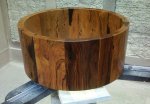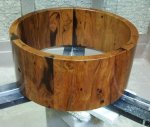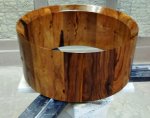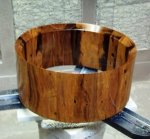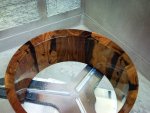MetallicaItalian
Senior Member
I've been doing a bunch of research and I thought I'd post some of my findings on common shell hardness that may clear up some confusion about semantics and misleading advertising.
Feel free to correct me, I know some of these numbers vary...
Bubinga -1980 (I know Tama manufactures full kits)
Jarrah - 1920 (Australian drum company, Brady uses this in their block snares, Dave dave Abbruzzese, formerly of Pearl Jam used these)
Hard Maple (Sugar) - 1450
Ash (White) - 1320 (Not sure if this is the same type used in certain kits like Gretsch, the price seems rather disproportionate, maybe the 1320 is used in the $5K Yamaha kits)
Beech - 1300
Northern Red Oak - 1290
Birch - 1210-1260
Asian (Western) Maple - 940 (likely used in most budget maple kits)
Phillipe Mahogany (Lauan, Dark Red Meranti/Seraya) - 780
Poplar - 540
Basswood - 410
Let me know if I'm missing anything important or have any incorrect ratings. I'll try adding photo examples at some point. I just thought this would be really helpful in understanding sometimes deceptive advertising. For example, Philippine Mahogany, often considered a cheap soft wood, is not much softer than Asian/Western Maple which might be deceiving when advertised simply as "Maple".
Feel free to correct me, I know some of these numbers vary...
Bubinga -1980 (I know Tama manufactures full kits)
Jarrah - 1920 (Australian drum company, Brady uses this in their block snares, Dave dave Abbruzzese, formerly of Pearl Jam used these)
Hard Maple (Sugar) - 1450
Ash (White) - 1320 (Not sure if this is the same type used in certain kits like Gretsch, the price seems rather disproportionate, maybe the 1320 is used in the $5K Yamaha kits)
Beech - 1300
Northern Red Oak - 1290
Birch - 1210-1260
Asian (Western) Maple - 940 (likely used in most budget maple kits)
Phillipe Mahogany (Lauan, Dark Red Meranti/Seraya) - 780
Poplar - 540
Basswood - 410
Let me know if I'm missing anything important or have any incorrect ratings. I'll try adding photo examples at some point. I just thought this would be really helpful in understanding sometimes deceptive advertising. For example, Philippine Mahogany, often considered a cheap soft wood, is not much softer than Asian/Western Maple which might be deceiving when advertised simply as "Maple".
Last edited:


